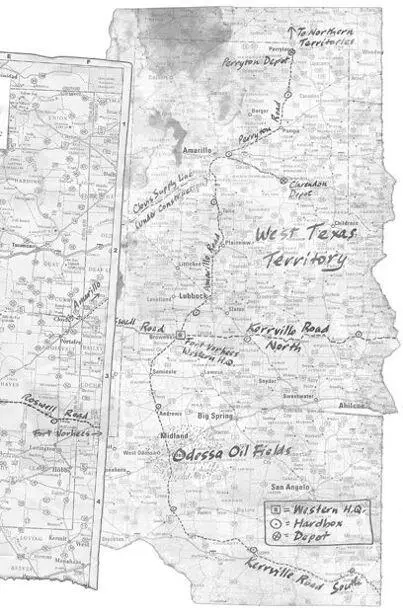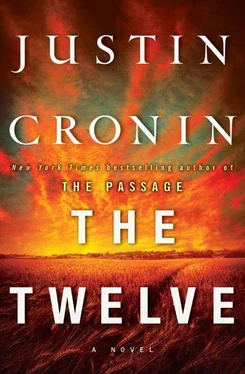“Nit! Siri! Where are you?”
Then there was a woman. She was standing in the middle of the row. She was draped in a dark cloak, like a woman in a fairy tale, some dweller of the forest; her head was covered by a hood, her eyes by dark glasses that concealed the upper half of her face. So total was Vorhees’s surprise that for a moment he thought he might be imagining her.
“Are they your daughters?”
Who was she, this woman of the corn? “Where are they?” he panted. “Do you know where they are?”
With a languid gesture she removed her glasses, revealing a face sensuously smooth and youthfully beautiful, with eyes that glinted in their sockets like diamonds. He felt a surge of nausea.
“You’re tired,” she said.
Suddenly, he was. Curtis Vorhees had never been so tired in his life. His head felt like an anvil; it weighed a thousand pounds. It took every ounce of will for him to remain standing.
“I have a daughter. Such a beautiful daughter.”
Behind him he heard the final, random pops of panicked gunfire. The field and sky had sunk into an unearthly darkness. He felt the urge to weep, but even this seemed beyond his command. He had dropped to his knees; soon he would fall.
“Please,” he choked.
“Come to me, beautiful children. Come to me in the dark.”
Somebody yanked him to his feet: Tifty. His face was very close. Vorhees could barely focus on it. The man was pulling him by the arm.
“Vor, come on!”
His tongue was thick in his mouth. “The woman…” But there was no one; the place where she had stood was empty. “Did you see her?”
“There’s no time! We have to get to the tower!”
Vorhees would have none of it; with the last of his strength he jerked away.
“I have to find them!”
It was the butt of Tifty’s rifle that brought everything to a halt. A single, crisp blow to the head, expertly aimed; Vorhees’s vision swarmed with stars. Then the world turned upside down as Tifty grabbed him by the waist and hurled him to his shoulder and began to run. Fat leaves streamed past, slapping his face. Vorhees was calling, “Nit! Siri! Come back!” But he had no strength to resist. His family was dead, he knew that; Tifty would not have come for him if they were still alive. More gunfire, the shouts of the dying all around. The hardboxes, a voice said. They came from the hardboxes. Who would survive this day? And Vorhees knew, to his infinite sorrow, that once again he would be one of the lucky ones.
They burst from the corn onto open ground. The shelter was wrecked, the tarp torn away, everything scattered. Bodies strewn everywhere, but he saw no children; the little ones were gone. Come to me, beautiful children. Come to me in the dark . And as the door of the tower slammed behind him and he tumbled to the floor, slipping at last into a merciful unconsciousness, his final thought was this:
Why did it have to be Tifty?
IV. THE CAVE




24
Wolgast had come to Amy at last. He had come to her in dreams.
They were sometimes in one place and sometimes another. They were stories of things that had happened, events and feelings from the past replayed; they were a jumble, a pastiche, an overlap of images that in their reconfiguration felt entirely new. They were her life, her past and present commingling, and they occupied her consciousness with such completeness that upon awakening she would startle to discover herself existing in a simple reality of firm objects and ordered time. It was as if the waking world and the sleeping world had exchanged positions, the latter possessing a superseding vividness that did not abate as she moved into the traces of her day. She would be pouring water from a pot, or reading to the children in circle, or sweeping leaves in the courtyard and without warning her mind would drown with sensation, as if she had slipped beneath the surface of the visible world into the currents of an underground river.
A carousel, its gyring lights and ringing, bell-like music falling. A taste of cold milk and the dust of powdered sugar on her lips. A room of blue light, her mind floating with fever, and the sound of a voice—Wolgast’s voice—gently leading her out of the darkness.
Come back to me, Amy, come back .
Most powerful of all was the dream of the room: dirty, stale-smelling, clothing scattered in piles, containers of old food atop every surface, a television blaring with meaningless cruelty in the corner, and the woman Amy understood to be her mother—she experienced this awareness with a gush of hopeless longing—moving through the cramped space with panicked energy, scooping things from the floor, tossing them into sacks. Come on, honey, wake up now. Amy, we got to go . They were leaving, her mother was leaving, the world had cleaved in two with Amy on one side of the gap and her mother on the opposite, the moment and its sentiments of parting unnaturally prolonged, as if she were watching her mother from the stern of a boat as it sailed away from the pier. She understood that it was here, in this room, that her life had actually begun. That she was witnessing a kind of birth.
But it wasn’t just the two of them. Wolgast was there as well. This made no sense; Wolgast had entered her life later. Yet the logic of the dream was such that his presence was intrinsically unremarkable; Wolgast was there because he was. At first Amy experienced his presence not as a bodily reality but a vaporous glow of emotion hovering over the scene. The more she felt her mother moving away from her, into a private urgency Amy neither shared nor comprehended—something terrible had happened—the more vivid became her sense of him. A deep calm infused her; she watched with a feeling of detachment, knowing that these events, which seemed to be occurring in a vivid present, had actually happened long ago. She was simultaneously experiencing them for the first time while also remembering them—she was both actor and observer—with the anomaly of Wolgast, whom she now discovered was sitting on the edge of the bed, her mother nowhere to be seen. He was wearing a dark suit and tie; his feet were bare. He was gazing absorbedly at his hands, which he held before him with the tips of his fingers touching. Here is the church , he intoned, weaving all but his index fingers together, and here is the steeple. Open the door —his thumbs separated to reveal his wriggling digits —and see all the people. Amy, hello .
—Hello, she said.
I am sorry I have been away. I’ve missed you .
—I’ve missed you, too.
The space around them had altered; the room had dispersed into a darkness in which only the two of them existed, like a pair of actors on a spotlit stage.
Something is changing .
—Yes. I think that it is.
You will need to go to him, Amy .
—Who? Who should I go to?
He’s different from the others. I could see it the first time I laid eyes on him. A glass of iced tea. That was all he wanted, to cool himself off in the heat. He loved that woman with his whole heart. But you know that, too, don’t you, Amy?
Читать дальше
















